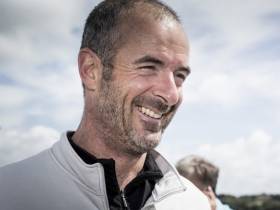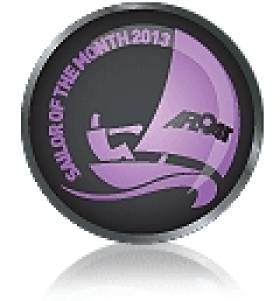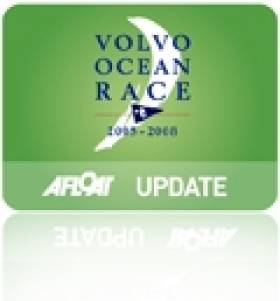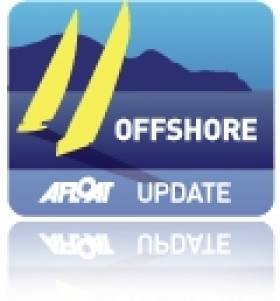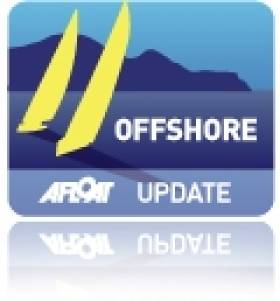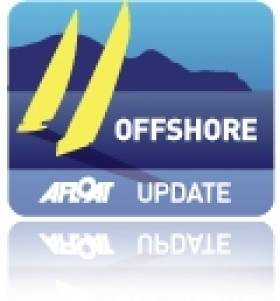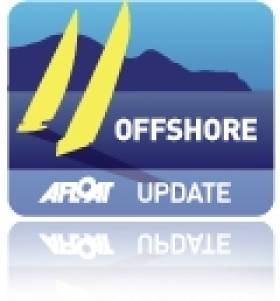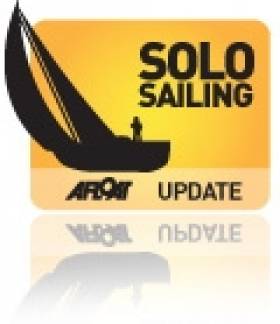Displaying items by tag: Sidney Gavignet
French skipper Sidney Gavignet’s crew of Omani sailors are no strangers to the 700 mile Round Ireland race track having famously smashed the record in 2015 after completing the course in 40 hours, 51 minutes and 57 seconds, some four hours faster than anything achieved previously. As a result, there will be an extra incentive for Kerry sailor Damian Foxall who despite previous bids was not onboard for the record breaking run last year. Foxall rejoins the crew for the Round Ireland in six weeks time and is very much looking to the multihulls debut in this year's offshore classic.
Fahad Al Hasni, Yasser Al Rahbi and Sami Al Shukaili were all on board for the record-breaking voyage and all return to action for the Round Ireland Race.
The team has developed a strong bond, says Gavignet so the prospect of lining up against other professional MOD70 crews in June for the start in Wicklow, to follow a course that leaves Ireland and all its islands excluding Rockall to starboard, serves to stir their competitive spirits.
“This Omani crew has a long history – last season especially was very demanding – so we have a very good team with a great team spirit,” said skipper Gavignet.
“We would like to win the race but know it will not be easy because the other MOD70s have been sailing a lot in the past few months. We have trained hard and the guys are performing at a different level now so we are very happy to go and do our best against the others.
“We hold the record but it is possible to do better and it is likely that whoever wins will set a new record, depending on the conditions. It is very exciting to be racing against Phaedo and Concise – it will be a good contest.”
Preparations for the race have included some intensive training offshore as well as participation in the Grand Prix Guyader in Douarnenez, France, last weekend where the Omani Diam 24 team onboard Oman Airports by Oman Sail finished in 3rd place.
This weekend MOD70 sailors Fahad, Sami and Yasser are due to compete on Oman Sail’s J80 at the Grand Prix Ecole Navale at the French Naval Academy in Lanvéoc to get some crucial fleet race practice.
Success in sailing against the clock for a speed record requires a different mindset to racing in a fleet, said Fahad, Oman’s most experienced and successful offshore sailor.
“Competing with other boats in the Round Ireland race will be different to breaking the record and probably a lot more difficult,” he said.
“The other MOD70s have been training and racing all year and have achieved some good results so they will be hard to beat. But we will be sailing the boat as fast as we can and if we can win, it will be fantastic for us because this is a two thirds Omani crew.”
Records are one thing but when you get two boats racing side by side, the results speak for themselves, commented Damian Foxall, acknowledged as Ireland’s most accomplished ocean sailor.
“This season, our campaigns are all about fleet racing. When you are racing against the clock, you never know if you are performing 100% but in fleet racing, if you are not going 100%, you probably aren’t winning. And you know pretty quickly whether you have taken a good or bad option.
“Fleet racing is more like a game of chess and what the other boats do on the course can affect your own tactics. So you have to be on your game 100% all the time and sail a lot harder. Our guys understand that completely.”
A couple of years ago, Musandam-Oman Sail would have been favourite to win the multihull class, Foxall continued but an upsurge in activity on the other MOD70s means they have a contest on their hands.
“The guys on Phaedo and Concise are sailing extremely well now so a couple of years ago, we might have been favourites but that is certainly no longer the case and we are going to have to compete really hard to get a result this year. But we know how to sail the boat so this is great and exactly how it should be.”
Sidney Gavignet Wins Afloat.ie International Award
#som – When a Round Ireland record has stood for nearly 22 years, clearly it is something very special, and the 44–hour time set by Steve Fossett's 60ft trimaran Lakota in 1993 has withstood several challenges, including three by top French skipper Sidney Gavignet.
It was Ireland's own Damian Foxall – a frequent shipmate of Gavignet – who first got him hooked on the challenge of the round Ireland record. So it was ironic that a mid-race call to Foxall to beef up one of the crews in the current Volvo World Race meant he was unavoidably absent on other business when Gavignet saw the opportunity developing for the MOD 70 Musandam-Oman to knock off the Ireland target at the beginning of May.
This month of notably atrocious weather provided one of those rare but perfect record conditions where a deep low pressure area sat plumb over the country on May 4th. But as ever, Donegal proved to be obtuse – up there, Musandam Oman was hampered by lack of wind.
However, Gavignet and his crew were soon making up lost time as they streaked down the Connacht coast in a strong nor'wester, and though they were well shy of taking the originally anticipated ten hours off Lakota's time when they returned to the finish line at the Kish L/H off Dublin Bay, they'd got down to within shouting distance of 40 hours in rugged sailing conditions which very deservedly make Sidney Gavignet the winner of an Afloat.ie International Award.
#VOR - Musandam-Oman Sail skipper Sidney Gavignet has been added to Dongfeng Race Team's crew as they prepare for the start of Volvo Ocean Race Leg 7 from Newport to Lisbon this weekend.
Gavignet comes fresh off the MOD70 trimaran's smashing of the Round Ireland speed sailing record last week to stand in for fellow Frenchman Eric Peron, who will return for the final two legs.
It also marks the latest in a series of crew rotations by skipper Charles Caudrelier on the Leg 6-winning yacht, after Kerry sailor and fellow VOR vet Damian Foxall lent his experience on Leg 5.
“He’s a Volvo Ocean Race expert, and I’ve been wanting to sail again with him for a long time," said Caudrelier of Gavignet. "We sailed together 12 years ago and it went really well so I can only hope this leg will be just as good.”
In other crew change news, Team Brunel have added CAMPER sailor Adam Minoprio to their line-up for the remaining legs.
The youngest ever sailor to be a match-racing world champion "could just make the difference in the last three short legs," said skipper Bouwe Bekking.
And Team Vestas Wind will welcome Australian sailor Tom Addis and Simeon Tienpont, Dutch veteran of the most recent America's Cup-winning crew, when their yacht is ready to rejoin the race in Lisbon for Leg 8 next month.
Their return to the fleet after their devastating grounding in the Indian Ocean late last year is sure to bring more eyes to the action as the finish line draws closer.
No one could be more pleased than VOR chief Knut Frostad, who tells the Yacht Racing Forum about the race's improving commercial position in a still-tough economic climate.
Another happy man is Ian Walker of Abu Dhabi Ocean Racing, who feels his team's performance in the race so far is set to eclipse the "injustice" of setbacks during the 2011-12 race, which included a broken mast in the first race, and limping towards Brazil in the Auckland-to-Itajaí leg with hull damage.
But as he tells Yahoo! News, the Azzam skipper is hesitant to call their current performance "revenge".
"It's like a Formula One race. If you haven't got the car, never mind how good the driver is. We had the potential to win but we never had the opportunity to demonstrate it."
Walker adds: "The race is not over yet at all. But we are in a strong position, a position where we don't have to beat Dongfeng in every leg. Which is important."
#roundireland - The World Sailing Speed Record Council has ratified a new Round Ireland Outright World Record set by Sidney Gavignet (FRA) and a crew of 5 on the MOD70 trimaran Musandam-Oman Sail. They completed the 698nm route on May 4-6 in a time of 40:51:57, posting an average speed of 17.08 knots. The previous record of 44:42:20 set in 1993 was held by Steve Fossett on Lakota.
It May Be A New Round Ireland Record But The Three Hour Margin Tells Us What A Great Job Lakota Did 22 Years Ago
#roundirelandrecord – At his fourth attempt, top French skipper Sidney Gavignet with the Mod 70 trimaran Musandam-Oman Sail has finally toppled the long-standing Round Ireland record set in September 1993 by American Steve Fossett with the 60ft trimaran Lakota, but by only three hours.
And if anything, the Gavignet achievement has heightened just what a remarkable job was done 22 years ago when the American skipper with his smaller, heavier and much less technically advanced boat set such an exceptional time writes W M Nixon.
Unlike the state-sponsored Musandam-Oman campaign (and it's one very rich state), the Lakota project was very much a private enterprise effort, with Fossett's crew including husband-and-wife multi-hull enthusiasts Con Murphy and Cathy MacAleavey of the National YC in Dun Laoghaire. They had met the Lakota crew in Portugal some months earlier, and had persuaded them that a successful round Ireland challenge was just what was needed to set Fossett's sailing on the track to high achievement, and their suggestion succeeded brilliantly on both counts.
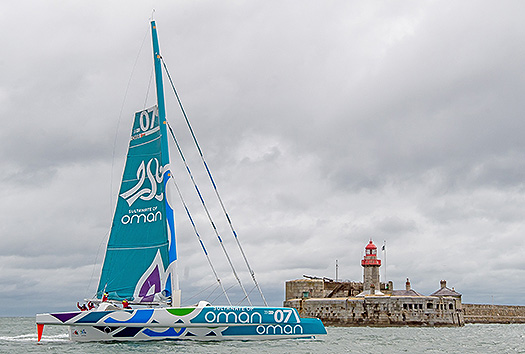
The new record holders – The mighty Mod70 returns to Dun Laoghaire this morning
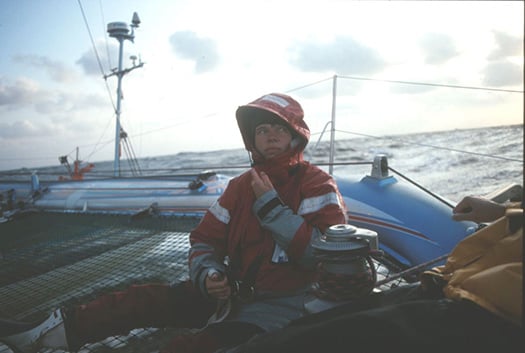
Cathy MacAleavey in some of the gentler conditions during Lakota's successful challenge
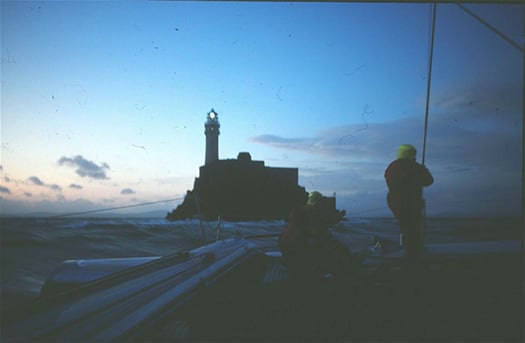
Getting there – when Lakota went past the Fastnet during her 1993 anti-clockwise circuit, they knew they were well on their way with the chance of an outstanding record.
Lakota's startling new time of 44 hours was not easily achieved, as the boat had arrived in Dun Laoghaire with a damaged mainsail which had to be rushed to Crosshaven for repairs by McWilliam Sailmakers while the clock was remorselessly ticking down towards the ideal situation of a vigorous low pressure area becoming centred over Ireland.
But as it happened, the Gods were on their side. The delay while waiting for the sail repair made the weather situation even better as far as records were concerned, and Lakota went round in style as regards speed, though for quite a lot of the passage she was sailing in conditions in which most people would have been very content to stay comfortably at home in front of a large fire.
And as the Lakota challenge included Irish crew and was Irish inspired, we all felt that we had a part of it, however small. But for this new record, the only Irish element has been the weather and our coastline, for although Gavignet's interest was first inspired some years ago by our own Damian Foxall who was involved in two of Gavignet's previous attempts on the Ireland challenge, the Kerryman is of course currently active in the Volvo World Race, and has had the frustration of watching from afar as Gavignet finally does the business.
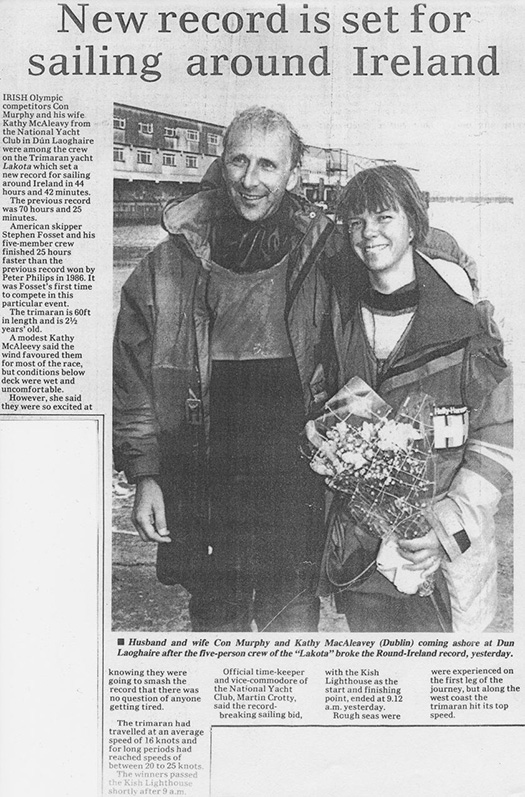
Tired but triumphant – Con and Cathy as pictured in the Evening Herald at the conclusion of Lakota's successful challenge
As it happens, although the monitoring of the challenge has been under Record Commissioner Chris Moore of the National Yacht Club, the crew is distinctly international, with two French – Gavignet himself and veteran Jean Baptiste Leavailliant, plus one Spanish, Alex Pella, and three Omanis who are now Gavignet veterans - Fahad Al Hasni, Yasser Al Rahbi, and Sami Al Shukaili.
The weather pattern was settling in nicely with strong sou'easters when they went off at 1800 hrs on Monday to storm northeastwards from the start point at the Kish L/H through the Irish Sea. But the current spell of volatile weather was making things decidedly moody over the north of Ireland. What had been a useful low pressure area of around 780 had already developed further to have two centres, and it may well have become the case that at least three different vortices were in action to provide unstable wind patterns of rapidly varying strengths, and sometimes no strength at all.
For the first stage, they'd been averaging speeds of up to 25 knots and better, and had confidently been anticipating knocking a cool ten hours off the record. That would have brought it in within the 35 hour working week so beloved of the French. But the fickle North Channel winds had other plans, and they unexpectedly dropped to just 6.32 knots SOG off Cushendall in County Antrim for a frustrating period around midnight on Monday.
Then they got going again along the North Coast, and were well back on track for a new record which, after all, required an average speed of only 16 knots. But one of the low pressure centres off the Donegal coast got itself all over the place through Tuesday afternoon, and progress was at times excruciatingly slow – at one stage northwest of Erris Head in far Mayo, they were crawling along at 3.11 knots, which for a MOD 70 is dead stopped.
The frustration was enormous, for they knew there were strong west to northwest winds on the way, and trying to get to them was the challenge. By Tuesday evening they were at last beginning to benefit, and then Musandam-Oman Sail fairly streaked south in very impressive style, zooming past the Blaskets and shaping her course with an ever-increasing eastern slant past the Skelligs and the Fastnet and along the south coast. She was tacking to lee at speeds which were hauling them rapidly back into the record business, but there was now no way they could make that elusive ten-hours-off-it target.
A least two high profile capsizes with MOD 70s – including on in Dublin Bay a couple of years ago – have shown that while they're able and versatile boats, they have their limits. So in tearing northwards along the east coast this morning in relatively smooth water with the wind off the land, care had to be taken that any sudden squalls off the mountains wouldn't take charge. But everything was kept firmly under control and the job was finished in businesslike style just before 11 o'clock this morning. And they're well pleased with their achievement, as it's a much clearer margin than the 16 minutes with which they bested Bank Populaire's Round Britain and Ireland record last year. So well done, Musandam-Oman Sail. And here's to the good old Lakota – she still sails the sea, a very special boat.
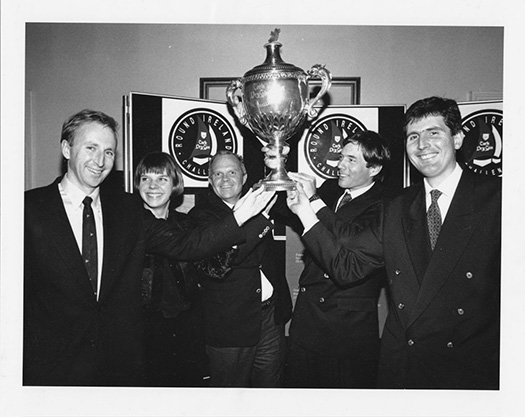
Victory! Lakota's crew with the trophy in 1993 are (left to right) Con Murphy, Cathy MacAleavey, the late Steve Fossett, Steve Scully, and Brian Thompson
#roundirelandspeeedsailing record – It's been a tricky second night at sea for Musandam-Oman Sail's in its Round Ireland speed sailing record bid. At 0600 the six-man international team is speeding past Dungarvan on the south coast at over 24 knots. It's an impressive speed but there is still approximately 120–nautical miles to sail to the Dublin Bay finish line. Force six winds are blowing from a favourable westerly direction and forecast to get stronger this morning and there is a flood tide until lunchtime, but several hours spent in little wind off the Mayo coast yesterday afternoon may yet prove costly.
This time yesterday, the crew were surfing across the top of Donegal. Only 12 hours ago, the team was halfway down the west coast of Ireland in a low pressure and 'on track for a mid–morning finish' this morning. Reports from onboard last night said 'It is likely to be a challenging night'. Since then they have sailed 170–nautical miles to the Fastnet Rock, hitting speeds of 27 knots off the Kerry coast. They came close inshore at Cape Clear at midnight before heading offshore again in an attempt to make faster progress along the Munster coast. Since midnight the crew have been focussing on the final 200 nautical miles to the finish.
To beat the 22–year record set by Steve Fosset's Lakota in 1993, the Oman Sail Mod 70 Multihull needs to cross the line before 1400 hours this afternoon. At 0800, with the final 100nm to go, the team, who had originally signalled an ETA at 'mid–morning' have revised this to be 'middle of the day'. It is an indication perhaps, if the Fosset record is broken, it will not be by much even if speeds do increase up the Wexford and Wicklow coasts this morning.
#roundirelandspeedrecord – With arguably the hardest part of the 700–mile journey already over, the northabout Oman Sail Trimaran is 75–miles off the Sligo/Mayo coast and on target to break the Round Ireland Speed Sailing record of one day and 20 hours. Having covered 300 nautical miles in 19–hours, the fastest part of this voyage is yet to come.
The six man crew were heading in a southerly direction (190 degrees) just before noon, expecting to crack sheets and accelerate down the west coast in some forecasted big winds, ready to reach estimated speeds of over 30–knots before the Fastnet rock.
Round Ireland Record Update (0700): Gavignet Eyes Record Time As Trimaran Surfs off Donegal
#roundirelandrecord – The Sultanate of Oman's MOD70 Musandam-Oman Sail has rounded the top of Ireland and was hitting 20–knots off the coast of Donegal in a bid for the 20–year–old Round Ireland Speed sailling record early this morning. Having started on Dublin Bay last night at 1800 hours and headed north, the current ETA back on Dublin Bay is scheduled for tomorrow (Wednesday) morning which means the record could fall by as much as ten hours. At 0730, as the big French–based Tri passed Bloody Foreland, the international crew were steering 284 degrees and heading deep offshore.
French skipper Sidney Gavignet was reunited with his three Omani crew Fahad Al Hasni, Yasser Al Rahbi and Sami Al Shukaili who were key members of his triumphant team when Musandam-Oman Sail smashed the Round Britain and Ireland world record last August and now it looks like the 1993 Round Ieland record set by Steve Fossett on Lakota may now also be in doubt.
The National Yacht Club is the base for the record bid and Irish World speed Sailing Commissioner Chris Moore is officiating.
Also on board the Tri is Spanish sailor Alex Pella and the French multihull veteran Jean Baptiste Levaillant who have joined the Omani trimaran for the attempt to beat the long standing Round Ireland record of 44 hours set back in September 1993.
"The goal is to give my Omani crewmates some real life training in a range of conditions and we are taking advantage of an ideal weather window," explained Gavignet who was last on the boat when he raced it single-handed across the Atlantic in the Route du Rhum in November 2014.
The forecast before they threw the lines at 17:04 UTC on Monday was for light conditions that were scheduled to build significantly overnight. Before casting off, Sidney warned that they would be playing it safe: "We will be watching the weather carefully and avoiding risks."
Musandam-Oman Sail made an attempt on the Round Ireland record two years ago but were forced to abandon due to unsafe conditions but hopes are high that this time, the weather will be kinder and allow Oman Sail to add this speed record to their growing collection.
"The current record is held by great sailors, so it would be a huge source of pride for us to break it and add such an achievement to our experience as sailors. We are expecting a lot of challenges and very low temperatures to the north, but we are prepared and hope to return with another record for Oman," said Fahad Al Hasni.
"We are focussing this season on the sailor's strength and fitness, but also on preparing the boat and studying the weather to make them better all round offshore sailors. There won't be many record attempts on our schedule in 2015, but this one is a primary goal and if we can get the record, it would be very good for the guys, for the country and for Oman Sail," added Gavignet.
Since the boat was launched following a routine refit, Gavignet has been training with his crew in Lorient and taking part in the Grand Prix Guyader in Douarnenez in Brittany, France, where they flew the Omani flag in Europe for the first time this year and got back into competitive racing mode after a winter sailing with other crew in other boats.
Read more about the history of the Round Ireland Speed Sailing Record
#omansail – The Oman Sail Trimaran crossed the Dublin Bay start line and headed northabout just after 6pm this evening in its latest bid to break the twenty–year Round Ireland Speed Record held by the late American adventurer Steve Fossett. French skipper Sidney Gavignet at the helm of the 70–footer cleared the Kish lighthouse start line, flying a hull and producing a cloud of spray as one of the fastest boats in the world reached full speed. Gavignet must beat a 44–hour record and be back on Dublin Bay just after lunch on Wednesday.
Winds on Dublin bay were at 18–knots and gusting to over 25 this evening presenting ideal conditions for this professional crew. Onboard are Alex Pella from Spain and Jean Baptiste Levaillant together with three Omani sailors and skipper Gavignet.
The southerly direction of the Dublin Bay breeze produced lumpy, one metre waves, giving Irish World Speed Sailing Commissioner Chris Moore a difficult berth for officiating the record bid from the Dublin Bay Sailing Club starting vessel located just off the Burford bank.
Having arrived from France only this morning, Gavignet took only the briefest pitstop at the National Yacht Club in Dun Laoghaire Harbour before heading back out to sea for what amounts to his third attempt at the Round Ireland speed record in recent years. Gavignet tried to break the record previously in 2013 but was beaten back by strong winds in the Irish Sea. By starting this evening he has made good on a promise to return and make a record attempt.
With potentially only one night at sea, which must be helpful for record-breaking, the current forecast suggests there's just a chance of some nor'east before they get to the South Rock, and there's a chance also of a flat spot on Tuesday evening. But either way it's a good forecast for Oman who must average 16–knots to be in with a chance.
Last season, the trimaran crossed the finish line of the 2014 Sevenstar Round Britain and Ireland Race off the Royal Yacht Squadron in Cowes in August with an elapsed time of three days, 03 hours, 32 minutes, 36 seconds breaking the previous World Record for a multihull held by Banque Populaire 5 in 2011, by 16 minutes, 38 seconds.
Within minutes of crossing the line this evening, the 70–foot colourful vessel had cleared the capital's waters and disappeared into the mist of the Irish Sea. Her six man crew recognising there are over 700–miles between them and a record that has stood the test of time since 1993. In September 1993, Fossett, (sailing with Con Murphy, Cathy MacAleavey, David Scully and Brian Thompson) put the Kish astern again after 44 hours 42 minutes and 20 seconds an average of 15.84 knots. It's a record which has stood for over 19 years but wiill it still be standing on Wednesday? Sources close to the crew say they are confident of knocking up to ten hours off the record time and are expecting to be home by Wednesday morning.
Attempt at Round Britain and Ireland Record Underway
The current single-handed record for the 1,785 nautical mile lap of Britain and Ireland stands at 6 days 6 hours 40 minutes and 31 seconds, which was set by fellow Frenchman Thomas Coville onboard his trimaran Sodebo in 2006. In order to beat his record, Sidney needs to maintain an average boat speed of above 11.86 knots.
The record route will see him head anti clockwise around Britain and Ireland finishing once again at Lizard Point. The weather team are currently predicting a slow start to the attempt, with light westerly winds, however the breeze is set to build from the south-west to provide 20 – 25 knot reaching conditions on the first night.
"My main aim before the Route du Rhum is to focus on sailing single handed. I don't need to practice boat speed, as I am confident that I can get the best out of the boat, but I need to practice sailing single-handed as it is a very different discipline from crewed racing. This record is not only a great challenge but being such a coastal route, it will give me some crucial navigational experience onboard and provide a real challenge for me mentally and physically, with the overall aim to push myself," Oman Air Skipper Sidney Gavignet.
Oman Air arrived in the French port of Loreint in July, after a delivery from her home port of Muscat in Oman. The team have been busy preparing for the up coming record attempt and training period ahead of the Route Du Rhum. It has been non –stop for the Omani team following the announcement of a title sponsor in the form of the national airline of the Sutanate, Oman Air. A complete re-brand of the trimaran followed, as well as switching the boat from her fully crewed setup to single handed racing.
The Round Britain and Ireland record attempt has seen a complete change in the setup onboard Oman Air, skipper Sidney has managed to save almost 500 kg by removing unnecessary items such as computer screens, the generator and the galley. Newly designed 3DL sails have arrived and been fitted, whilst Sidney and the team have been waiting on standby for the record attempt. Sidney commented ahead of the attempt, "The boat has a new sponsor and we are setup and ready to go. I have wanted to take on this record for some time and with the Route Du Rhum fast approaching my departure dates are limited. I have been working closely with the weather routers and the forecasts look good so it has to be now! I hope the weather conditions give me a good chance me to beat Thomas Coville's record, which he set almost exactly four years ago. The coast of Britain is roughly half the length of the Route du Rhum, and it is a difficult coast to navigate. I am sure this is going to be a huge challenge with little time for sleep".



























